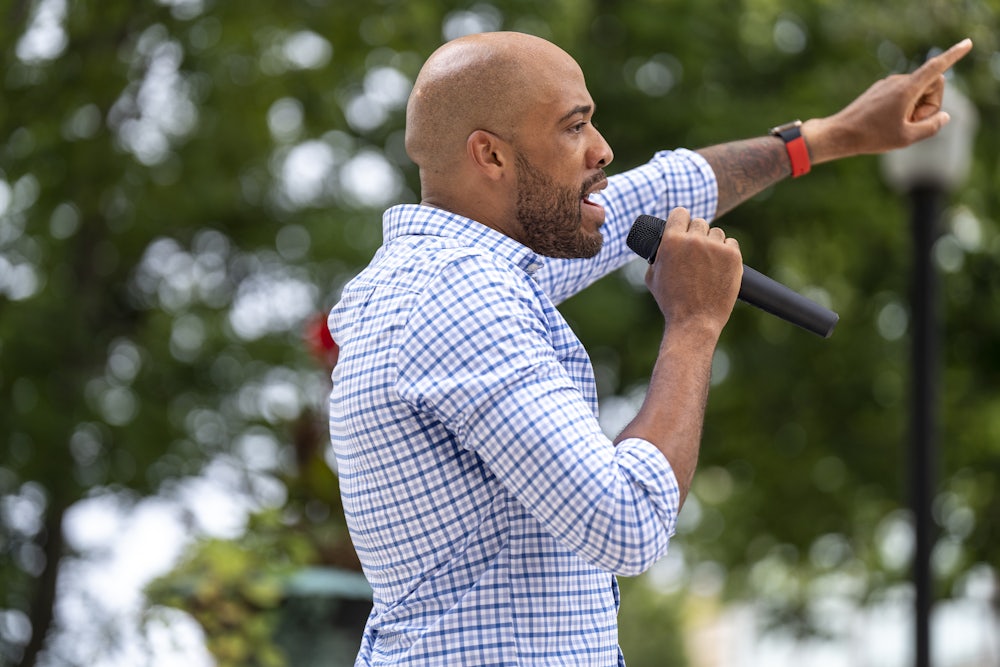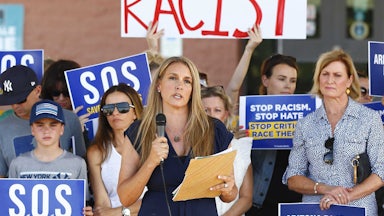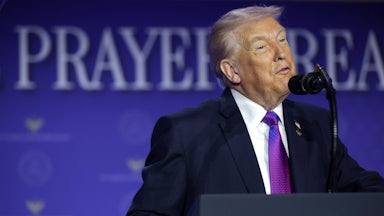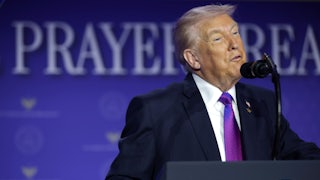For weeks, Wisconsin Republican Senator Ron Johnson and his allies have been running a set of attack ads against Lieutenant Governor Mandela Barnes about crime. One ad focuses on violent crime rising across the state and portrays Barnes as someone who wants to shrink the number of police officers and release criminals from jail. Another ad accuses Barnes of refusing to pay property and income taxes. A third ad, released Monday, accuses Barnes of mocking Representative Steve Scalise for getting shot by a gunman a few years ago.
As the ads have aired, polling has found Barnes’s lead over Johnson dwindle and then disappear altogether, with Johnson now ahead by a few points. The purpose of these ads was clear: Paint the young Democratic nominee for Senate, who is Black, as an advocate of lawlessness and crime.
This week, Barnes moved to counterpunch by focusing on abortion. His campaign released its own attack ad, calling the incumbent senator’s attacks on Barnes lies and then pivoting to abortion, asserting—accurately—that Johnson supported legislation banning abortions and backed legislation that did not offer exceptions for victims of rape or incest. The narrator says in part: “He co-sponsored a bill that makes no exception for rape, incest, or the life of a woman. And Johnson said if women don’t like it, they can move.”
Barnes’s campaign also announced Monday that it is hosting multiple abortion-focused events in Madison, Eau Claire, and Milwaukee over the course of this week. During an MSNBC hit the Democratic nominee did on Monday, Barnes said Johnson’s “position is too extreme and out of touch for the people of Wisconsin, especially the 70 percent that agree that Roe v. Wade should be the law of the land.”
The attack strategies of the two opposing camps here—the Republican accusing his Democratic opponent of being a gateway to rampant criminal behavior and crime, and the Democrat hammering his Republican opponent on his strict opposition to abortion protections—is increasingly the dynamic of major statewide and federal races across the country just about a month before the midterm elections.
The Wisconsin race is uniquely important though. If Barnes were to win, he would be the first African American senator from Wisconsin. Johnson, meanwhile, is a two-term senator who likes to indulge in some of the most widely debunked conspiracy theories. On January 6, 2021, he almost facilitated passing a set of fake electors to then Vice President Mike Pence (an aide to Pence was the one who stopped the handover). Johnson has also used racial dog whistles, or arguably language more outright than just a dog whistle, before. Of the January 6 rioters, he infamously said: “Now, had the tables been turned—Joe, this could get me in trouble—had the tables been turned, and President Trump won the election and those were tens of thousands of Black Lives Matter and antifa protesters, I might have been a little concerned.”
Depending on the outcomes of a few other races across the country, the Wisconsin Senate race could literally decide control of the Senate. “We always knew this was going to be a difficult race and this one has enormous national significance,” Democratic State Senator Kelda Roys told me.
For much of the cycle the Wisconsin Senate race was considered one of Democrats’ best pickup opportunities, behind only Pennsylvania. But even the most optimistic Democrats I’ve talked to this cycle concede that outlook has changed. In his last election, Johnson beat former Senator Russ Feingold in a rematch of their 2010 race by about four percentage points after many Republicans left him for dead. He was first elected by a similar margin despite being labeled as an underdog through most of the 2010 election cycle.
A month ago, the situation was much the same as in those races. Barnes had been leading Johnson at one point in August by seven percentage points. That’s basically an unheard of margin in a state that almost always has tight elections. But after the pro-Johnson group Wisconsin Truth PAC began hitting Barnes on policing and the support he has received from groups that have also backed the liberal “defund the police” platform, that lead has flipped to Johnson. Barnes’s campaign tried to counter by airing ads laying out how Barnes hoped to keep Wisconsin communities safe. But polls kept moving Johnson’s way.
The recent polling has found both candidates are viewed more unfavorably by the electorate than favorably. The problem for Barnes is that while he enjoys very strong support among Black Wisconsinites, according to 2020 exit polls, Blacks only made up 6 percent of the electorate then. Barnes should win that small vote overwhelmingly, but he trails Johnson among white voters by 10 percentage points, according to a September AARP poll. That’s the type of voter who would be most susceptible to an ad blitz focused on crime. It’s also the part of the electorate Barnes needs at this point.
Barnes’s pivot to abortion makes sense, even if the national discourse has somewhat moved away from the topic only a few months after the Dobbs decision. The same polling shows that persuadable voters, who play a crucial role in closely divided states like Wisconsin, view abortion as a far more important issue than crime and gun control, behind only inflation and rising prices. The AARP poll found 16 percent of those surveyed listed inflation and rising prices as the top issue, followed by abortion at 15 percent (a statistical tie). And law and order and crime? Just 4 percent said that issue is the most important topic for them.
But the crime-focused attack ads did damage to Barnes, and it’s clear why. They fit into the stereotype of crime-ridden cities that also happen to have high concentrations of Black residents. Only a few years ago Milwaukee ranked as the most racially segregated city in the country. It remains highly segregated. So stoking fear among white voters in the suburbs is easy but the facts don’t really support Johnson’s fearmongering. In Milwaukee this year, most violent crime is down roughly 8 to 14 percent, although homicides are up substantially over 2021.
At this point, a pivot to a different topic may be too late. But Democrats stress that on the ground it’s still a highly galvanizing issue. “When I talk to voters, this is absolutely top of mind,” Roys said of abortion. “Reproductive rights, abortion, access to birth control—people really are furious about the Dobbs decision.”
That said, the perception of Barnes as a “dangerous” and active enemy of the police has saturated the minds of many of the voters Barnes needs to win reelection. Johnson could still very well win and the implications of that are serious. If Johnson does win again it will be largely because he and his allies opted for the well-worn strategy of portraying an African American candidate as an irascible, delinquent enemy of law and order eager to release criminals. It’s an ugly caricature of a candidate, but one that voters may not be able to separate from the truth.










